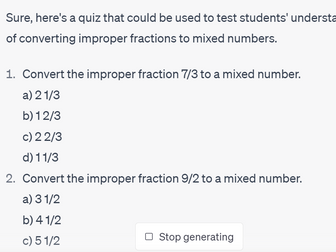Ten useful GPT prompts for teaching fractions
<p>For use with openAI’s ChatGPT or Google Bard;</p>
<p>These prompts are helpful because they provide a variety of learning activities, address misconceptions, make real-world connections, cover a broad range of topics, allow for differentiated instruction, promote interactive learning, and facilitate regular assessment.</p>
<p>Variety of Learning Activities: The prompts offer a range of learning activities, such as practice problems, quizzes, games, and step-by-step guides. This variety caters to different learning styles and keeps students engaged. Some students might learn better through interactive games, while others may prefer structured practice problems.</p>
<p>Addresses Misconceptions: One of the prompts specifically deals with common misconceptions about fractions. Misconceptions can hinder learning and progress. By addressing them directly, the teacher can ensure that students build a correct and deep understanding of fractions.</p>
<p>Real-World Connections: The prompts encourage the teacher to make connections between fractions and real-world applications. This not only makes the learning more engaging but also helps students understand why they need to learn about fractions.</p>
<p>Comprehensive Coverage: The prompts cover a broad range of topics related to fractions, including mixed numbers, addition and subtraction of fractions, conversion between improper fractions and mixed numbers, equivalent fractions, simplifying fractions, and the relationship between fractions, decimals, and percentages. This comprehensive coverage ensures students gain a well-rounded understanding of fractions.</p>
<p>Differentiated Instruction: The prompts allow for differentiation. For instance, the teacher can adjust the difficulty of the mixed number problems or use different strategies for simplifying fractions to cater to students of different skill levels.</p>
<p>Interactive Learning: The prompts promote interactive learning, such as through the development of a fun game for practicing fraction multiplication and division. Interactive learning can improve student engagement and retention of information.</p>
<p>Assessment: Some of the prompts, like designing a quiz, help in assessing students’ understanding of fractions. Regular assessments are crucial for monitoring students’ progress and identifying areas where they may need extra help.</p>
